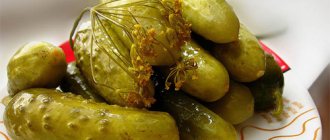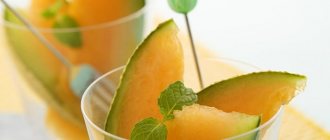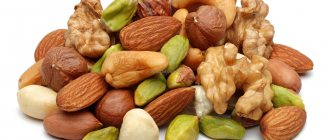Types of yogurt
Yogurt with fruit
Yogurts are divided into those that contain “live” bacteria and those that do not. The first type of product has a short shelf life - no more than 5-7 days at a temperature of +7...+8°C. If a jar of yogurt states that it can be consumed for several weeks, it means it contains preservatives. They artificially increase the shelf life, but there will be almost no benefit from such a product.
The active bacteria for which this fermented milk drink is so prized do not live that long. Preservatives in the product do not bring any benefit, but, on the contrary, can cause the development of dangerous diseases - cancer, chronic problems with the liver, gastrointestinal tract and others.
Drinking yoghurts are available on the market in a wide range of flavors
You can find the following varieties of yogurt:
- drinking. Often contains a lot of sugar. It is also produced together with pieces of fruit, berries, cereals, and other additives;
- yoghurt product. In this case, the raw materials are subjected to pasteurization. The finished product does not contain live cultures, thanks to which it is considered useful;
- thermostatic. It is obtained by fermentation in packaging, which is subjected to a certain heat treatment. As a result, some of the beneficial microflora is preserved, but there is little benefit from such a product. Its shelf life is more than 3 weeks;
- fruit. Contains pieces of fruit or berries, juice. Blueberry, peach, strawberry and others are popular.
Yogurt - good or bad?
Homemade yogurt
The choice of healthy dessert is not limited to the assortment presented in the store. Any mother can make the healthiest yogurt at home on her own. There is nothing complicated about this.
Of course, to get the perfect result, it is advisable to purchase a special yogurt maker. Home appliance stores offer a wide selection of high-tech appliances. Yogurt makers differ in the number of jars and the volume of a single load of milk. Any family will be able to choose a suitable option. Using a yogurt maker allows you to maintain a stable temperature and obtain a product of ideal consistency with the correct balance of lactic acid bacteria. With this method, yogurt is prepared by analogy with thermostatic one.
In most apartments today you can find a multicooker. Some of them have the function of making this delicate dessert.
There are a lot of starter cultures from different manufacturers for preparing fermented milk products. All starters differ in their effect on the body. Any buyer will be able to choose an option according to their needs to solve specific problems. Some starter cultures have a complex healing effect; yogurt prepared with their help will be an excellent preventive measure for various diseases.
Making yogurt at home allows you to adjust the fat content of the dessert, add your favorite additives and prepare delicacies for every taste. The method of using the starter is described in detail on the packaging.
Most of all, a newborn baby needs the tireless care of its mother. The main thing a young mother can give her child is breastfeeding. For successful feeding, you need to approach the issue of menu planning wisely and include only healthy foods in your diet.
The birth of a baby is a big event in a woman’s life. I want the baby to grow up healthy from the first days. For this, it is very important to maintain breastfeeding. But remember, all the foods that the mother eats end up in the milk and are passed on to the baby. That is why a woman’s menu should be balanced.
What can a nursing mother eat? Many women are very worried that because of the bans they will remain hungry. Don't panic - the list of products is extensive and varied. The menu should include fruits (bananas, apples), vegetables (except cucumbers and tomatoes), meat (lamb and pork are prohibited), dairy products, and cereals. Let's not get ahead of ourselves and figure everything out in order.
Nutritional value
100 g of yogurt contains approximately 50-70 kcal, depending on its fat content and the presence of various additives. A product with fruit filling, which is prepared with the addition of a large amount of sugar, can be more high in calories - 100-120 kcal per 100 g. Yogurt contains about 1-5% fat, depending on the milk from which it is made. Proteins in a natural product without additives are at least 4%, and carbohydrates – 6%. In the presence of any fillers, these percentages change up or down.
Energy value of yogurt
Yogurt also contains the following beneficial substances:
- unsaturated fatty acids;
- mono and disaccharides;
- cholesterol;
- organic acids;
- vitamins – PP, C, A, group B;
- minerals - fluorine, calcium, potassium, sodium, chlorine, phosphorus and others.
Is it possible to use yogurt while breastfeeding?
Natural yogurt is one of the healthiest foods for all people without exception. It contains vitamins, minerals, calcium, which promote the development of bone, nervous, and cardiovascular systems. All this is important for a growing child’s body, so a nursing mother should not refuse to eat a tasty treat.
All yoghurts are a storehouse of natural protein, without which the body cannot absorb fats and carbohydrates. The product contains probiotics, which are responsible for the normal functioning of the digestive system of both the mother and her baby. Lactobacilli penetrate the baby’s digestive tract along with breast milk, improving the functioning of the toddler’s intestines.
Beneficial features
The benefits of homemade yogurt
This fermented milk product has the following positive properties for the human body:
- 100 g of natural dessert contains 30% of the daily calcium requirement. Therefore, if you consume it regularly, your bones and teeth will be healthy and strong. It is worth noting that yogurt also contains vitamin B12, without which normal absorption of calcium is impossible;
- Eating 150 g of dessert will saturate the body with 65% of the daily iodine requirement. This element is especially necessary for the normal functioning of the thyroid gland and improvement of metabolism in the body;
- due to the presence of B vitamins in the dessert, the condition of the skin is significantly improved, the activity of all organs and systems is normalized;
- the content of live cultures in fermented milk products has a positive effect on the digestion process. Constipation and dysbacteriosis are eliminated, food absorption is improved, which has a positive effect on the immune system;
- One serving contains about 40% of the daily requirement of phosphorus. It is necessary to maintain the normal condition of bones and teeth. This element also takes part in the process of formation of new cells;
- the presence of a large amount of vitamins, micro and macroelements has a positive effect on all organs and systems - blood pressure is normalized, and the development of osteoporosis is prevented.
Homemade yogurt
Benefits of yogurt during breastfeeding
We see many types of yoghurts on store shelves every day. Of course, not all of them are healthy, so a nursing woman should always read the ingredients of the product, or even better, prepare it at home. Natural yogurt is beneficial for a nursing mother, as it contains the following substances:
- Calcium, which promotes the following improvements:
- full formation of the baby’s skeletal and cardiovascular systems;
- improving the functioning of nerve endings;
- improving the condition of teeth, hair and nails.
- Probiotics (beneficial live bacteria) that normalize the proper functioning of the stomach of mother and baby, increasing the baby’s immunity.
- Protein that promotes normal absorption of fats and carbohydrates, increasing hemoglobin levels.
- Iodine, which helps normalize the thyroid gland and improves metabolism.
- Vitamin B, which is responsible for the proper functioning of the entire body and helps improve skin condition.
- Phosphorus, which takes part in the formation of new cells and strengthens bones.
Natural yogurt contains phosphorus, which takes part in the formation of new cells and strengthens bones.
During the period of breastfeeding, yogurt was in second place for me after kefir in eliminating problems in the intestines. The benefits were felt immediately, and homemade yoghurts are very tasty and tender. My husband brought them to me at the maternity hospital - neither I nor the child had a negative reaction.
Possible harm

You need to understand that yogurt that contains any preservatives, flavor enhancers, thickeners, flavors, and other chemical compounds brings practically no benefit. Such yogurt will do more harm, since these substances have a negative effect on the human body. These desserts contain a lot of sugar, which is also not beneficial.
Therefore, when choosing yogurt, you should avoid those that have a long shelf life - more than 7 days. You should also pay attention to the label on the jar, which lists all the ingredients. The natural product contains only milk, sourdough, and cream.
When preparing a homemade dessert, it is imperative to pasteurize the raw materials. Milk may contain pathogenic microorganisms that cause dangerous diseases. Therefore, even a natural homemade product sometimes poses a danger if the technology was not followed during its preparation.
How to choose the right yogurt?
When buying natural yogurt for a nursing mother, pay attention to the information on the packaging.
- Name. Rosselkhoznadzor monitors compliance of dairy products with standard requirements. Yogurt can be called one that is made from natural milk (or derivatives from it). If the name contains phrases such as “yogurt product”, “dessert”, “milk-containing”, then it is better to avoid delicacies.
- Best before date. According to GOST, natural fermented milk product can be stored for no more than a week. It is important to pay attention to the deadline for implementation. Freshness is an important quality, since the number of beneficial starter microorganisms decreases with each passing day.
- Compound. Yogurt, which is most beneficial for breastfeeding, is made from milk and starter microorganisms (thermophilic lactic acid streptococci, Bulgarian lactic acid bacillus). If probiotic microorganisms are additionally included in the composition, then this is already bio-yogurt, which will also be useful for a young mother. In addition to the main components, enriched yogurt may contain dietary fiber, microelements, vitamins, and bifidobacteria.
A nursing mother can only consume yogurt every day, which meets all the needs for producing high-quality breast milk, starting from the first days of feeding the baby.
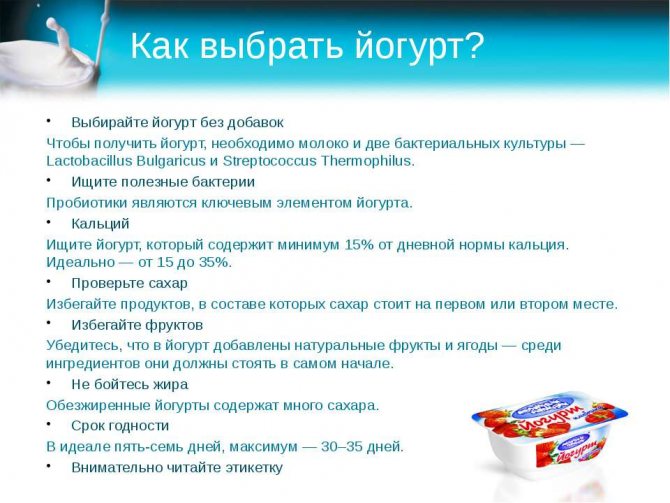
When choosing yogurt, read the label carefully
Can a nursing woman have yoghurts with additives?
Modern production has oversaturated the market with dairy and milk-containing products, which include food additives. Dyes, thickeners, preservatives improve the characteristics of the product: enhance taste and smell, regulate the uniformity of consistency, and increase shelf life. these components can harm the child’s fragile body.
What additives in yoghurt can be used when feeding a baby? To diversify the taste and color, and increase nutritional value, the following components are added to the composition of natural lactic acids:
- Fruit, berry and vegetable additives, nuts, cereals, dried fruits
- Biological active substances (calcium, iron, vitamins)
- Probiotic microorganisms
- Sugar, sweeteners
When breastfeeding, fruit, berry and vegetable yogurts should be excluded from the menu, as they can cause allergies and indigestion in the baby. Nuts, citrus fruits, fruits and red berries are allergens; you should refrain from consuming them during breastfeeding. Other fruits are acceptable in yogurt, but include them in doses and gradually. Monitor your child's reaction.
Cereals contain gluten. First make sure that the baby is not sensitive to this protein.
You should not overuse sugar and sugar substitutes, as this can also cause diathesis in the child and unwanted intestinal activity (constipation, colic).
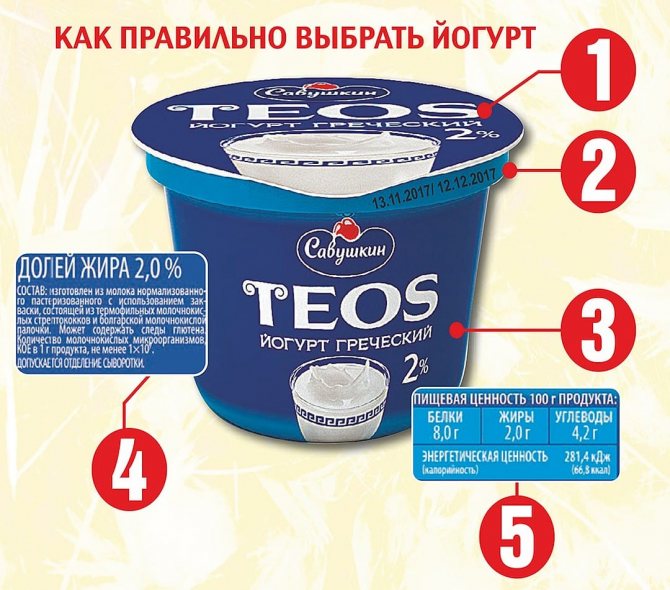
Yogurt with additives is not the best choice for a nursing mother
Yogurt for nursing mothers
Homemade yogurt recipe
In the first month after giving birth, you can treat yourself to yogurt. It is only important to buy a product with a natural composition that does not contain preservatives. You can also make yogurt for a nursing mother with your own hands. To do this, mix warm milk with a special starter. The product obtained after ripening is recommended for a nursing mother to eat even 1 month after birth and throughout the entire period of lactation. In this way it is very easy to improve bowel movements, improve digestion and improve immunity.
Mothers 1 month after giving birth can also add cereals to this dessert. It is best to introduce berries - blueberries, blackberries, raspberries, strawberries - when the baby is six months old. Mothers 1 month after giving birth should remember that children are susceptible to allergies. For the same reason, yogurt should be introduced gradually so as not to cause a negative reaction in the child. If after getting acquainted with the product the baby feels good, then the mother can eat it every day, even at 1 month.
The daily intake of yogurt is no more than 0.9-1.1 liters. A nursing mother should limit herself to a serving of 100-200 g at 1 month.
Delicious homemade recipes
We have already figured out whether a nursing mother can have yogurt. You can cook it yourself. At its core, it is ordinary kefir with added flavors. During lactation, you can use fresh berries. Jam should be chosen only in extreme cases.
Only small amounts of additional ingredients may be used. In this case, the treat will provide maximum benefit. Drinking yogurt may additionally include banana, prunes, permitted berries and fruits.
The main thing is that the baby has not previously had a negative reaction or allergy to one of the selected options. To obtain a homogeneous mass, it is best to use a blender. Honey, fructose and cane sugar can be used as a sweetener. Before serving, the resulting composition is poured into small bowls.
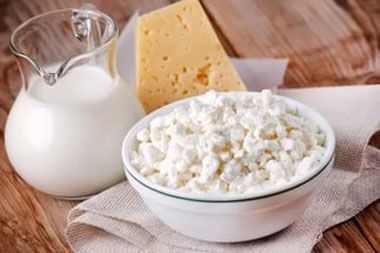
Fermented milk dishes must be present in a woman’s diet
To prepare the dish you will need a special starter. It is also recommended to use only pasteurized milk, which is heated to ninety degrees. After this, it must be allowed to cool for a certain period. Only at a temperature of 45 degrees is it possible to mix all ingredients. The fermentation itself will require twelve hours. You can discover all the flavors of yogurt if it is cooled to 10 degrees.
Yogurt is the perfect snack between breakfast and lunch. In terms of its beneficial properties, it can compete with cottage cheese. Regular consumption will compensate for the lack of calcium and probiotics. It must be included in a woman’s diet during lactation along with kefir and cottage cheese. With the help of fermented milk products, you can quickly and effectively get rid of hunger and enrich the body with all the missing components. Yogurt is a source of microelements. However, mothers should not forget about moderation in food. Any product, even the healthiest one, can negatively affect the body in excessive quantities. Mommy should not forget this rule.
Every person should consume dairy products at least once a day - these are the recommendations any doctor will give. But is it possible to use yogurt while breastfeeding, because when it comes to a nursing mother, many rules have to be seriously revised, or even abandoned altogether?
We will discuss this issue so that you do not have any doubts, and we will also learn how to choose the right dairy product.
After childbirth, any woman’s body needs restoration, and therefore it is necessary to adhere to a healthy and proper diet. In addition, when breastfeeding, most of the trace elements, minerals and vitamins leave the mother's body, going into breast milk - it is important that the baby receives everything he needs for growth and development.
This is why young mothers often experience a deterioration in their overall health in the first months after childbirth, and may also develop some health problems.
Constipation, a decrease in the body's protective functions - all these are quite common phenomena that indicate a violation of the intestinal microflora.
Beneficial bacteria responsible for our immunity live in the intestines - which is why yogurt can be shown to a nursing mother as a valuable dietary supplement.
In addition, very often successful mothers are worried about constipation and disturbances in the functioning of the large intestine, which can even cause hemorrhoids - a problem that is not so rare for those who have given birth. Lactic acid products rich in beneficial microorganisms also help to avoid this.
The benefits or harms of store-bought yogurts for a nursing mother
But is it possible to treat yourself to a sweet dessert from the store or buy chilled drinking yoghurts? Let's figure out what exactly is the usefulness of this product in order to understand which jar you can choose from the shelf in the supermarket and which one you shouldn't.
During breastfeeding, especially in the first month after birth, the mother’s body is very sensitive, and therefore it is better not to overload it with harmful components and chemical additives. In addition, everything that a nursing woman eats is inevitably processed into breast milk.
Allergies and gastrointestinal problems in a baby
There is no point in buying yogurt if it is stuffed with preservatives and flavor enhancers - such a fermented milk delicacy will be of no use anyway. But you can quickly develop a real food allergy - especially for the susceptible body of a newborn.
- Many mothers notice that after unnatural yoghurts with aggressive additives (strawberries, raspberries, citruses, chocolate, etc.), babies begin to suffer from colic and problems with stool.
- If you want to supplement your diet with a safe and healthy product, then avoid those desserts that contain dyes and an abundance of sugar.
Natural yogurt always has a short shelf life - this is how you can easily identify a chemical product. Often, a homemade dessert or one that is made in accordance with all norms and standards is suitable for consumption only for 3-5 days.
If the packaging of a dairy delicacy states that the product can be stored for more than a week, or even a month, then know that this is a harmful dessert, stuffed with all sorts of additives.
The benefits of yoghurts with live bacteria
Alas, not all mothers are aware that the number of lactic acid bacteria inside the jar is also the most important factor when choosing yoghurts. The fact is that it is precisely such a starter that determines the usefulness of a fermented milk dish - the higher this indicator, the more actively the product will fight intestinal dysbiosis.
In chemical desserts and yogurt masses from the store, this parameter is sometimes not even indicated on the label, since the product itself, although sold under the guise of fermented milk, has nothing to do with real yogurt.
- Meanwhile, for a nursing mother, a high-quality dessert can be a real salvation if she is bothered by constipation or intestinal microflora disorders - it is enough to eat a glass of yogurt on an empty stomach every day to cope with an unpleasant illness without the use of pills and tablets.
- Since a woman’s diet can also influence the baby’s body, you can solve a “problem tummy” in your baby in a similar way: just soak a handful of raisins and prunes in water, drain it and mix the dried fruits with yogurt. Eat dessert several times a day before meals, and your baby’s constipation will quickly stop tormenting you.
But, of course, this advice is good and will only apply to those children who do not have food allergies. Also, you should not indulge in fermented milk products if the baby is bothered by loose stools and gases - yogurt, due to its bacterial composition, can enhance the fermentation processes in the intestines.


